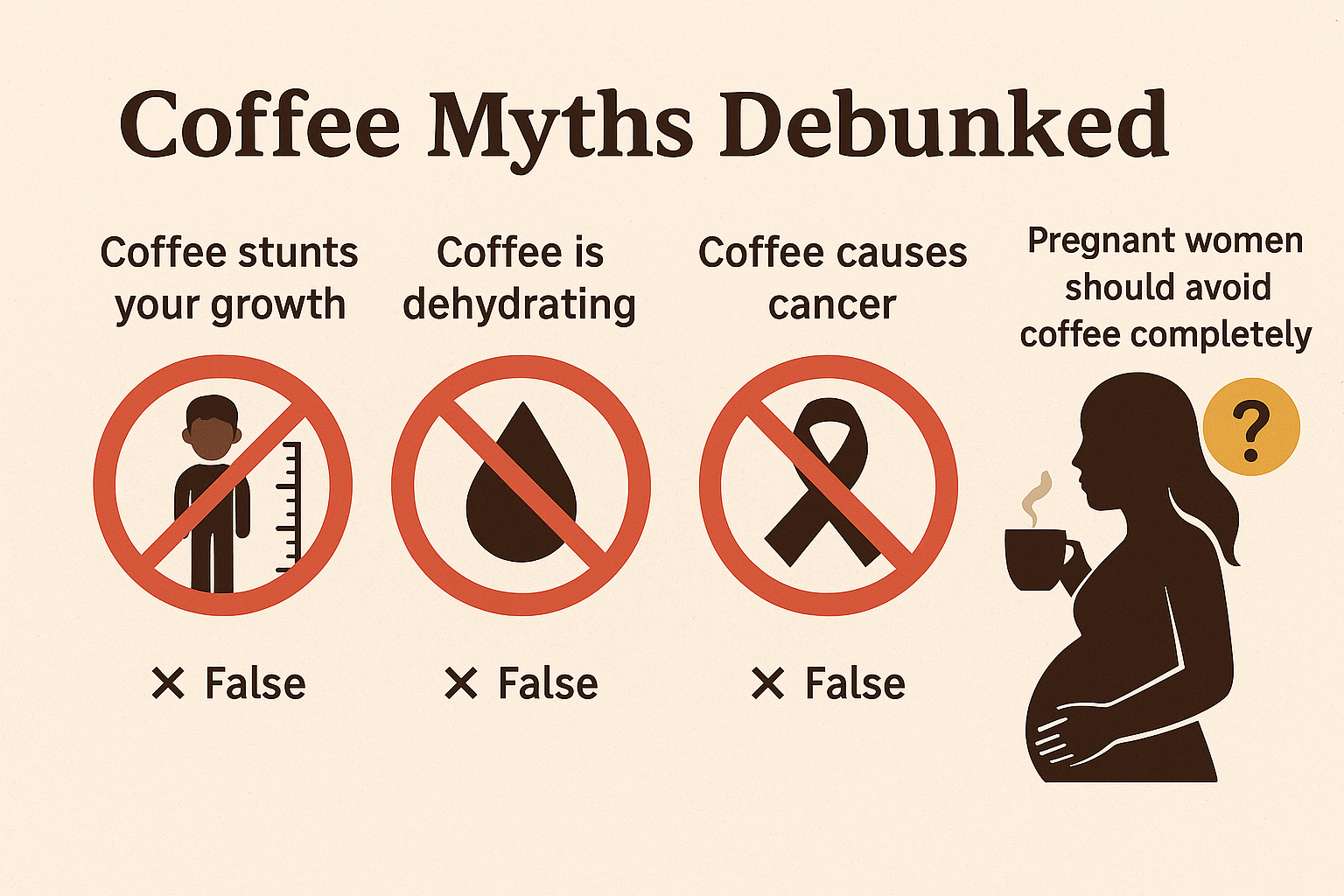Coffee is one of the most consumed beverages in the world, yet it’s also one of the most misunderstood. Over the years, coffee has been the subject of numerous myths—some amusing, some alarming, and others just plain wrong.
From ideas about dehydration and stunted growth to conflicting reports on its health benefits, coffee myths have shaped how people view this beloved drink.
In this article, we’ll break down some of the most persistent coffee myths and separate fact from fiction, so you can enjoy your next cup with confidence.
Myth 1: Coffee Stunts Your Growth
This is perhaps one of the most common myths, especially told to teenagers who develop a taste for caffeine. The idea that coffee stunts growth likely originated in the early 20th century, when advertisements for caffeine-free products claimed that their drinks were healthier for children.
However, there is no scientific evidence supporting this claim. Studies have shown that coffee does not affect bone growth or height in children or adolescents. While caffeine can affect calcium absorption slightly, the impact is minimal and can easily be offset by a diet rich in calcium.
Verdict: ❌ False
Myth 2: Coffee Is Dehydrating
Another popular belief is that coffee dehydrates you because it’s a diuretic. While it’s true that caffeine can have a mild diuretic effect, it doesn’t cancel out the hydration you get from the liquid in coffee.
Recent research has shown that moderate coffee consumption contributes to daily fluid intake, and does not lead to dehydration. As long as you’re not drinking coffee exclusively and neglecting water, you have nothing to worry about.
Verdict: ❌ False
Myth 3: Coffee Causes Insomnia
Coffee contains caffeine, a natural stimulant that can certainly interfere with sleep—especially if consumed late in the day. However, the notion that coffee inevitably causes insomnia is an exaggeration.
Caffeine’s half-life in your body is around 5 to 6 hours, meaning if you drink coffee in the morning or early afternoon, it’s unlikely to affect your sleep at night. However, caffeine sensitivity varies from person to person, and some people metabolize it slower than others.
If you struggle with sleep, it’s wise to avoid caffeine after 2 or 3 PM. But blaming your entire insomnia on your morning cup of joe? Probably not accurate.
Verdict: ⚠️ Partially True (Depends on timing and individual sensitivity)
Myth 4: Dark Roast Has More Caffeine Than Light Roast
It seems intuitive—dark roast coffee tastes bolder, so it must have more caffeine, right? Actually, the opposite is often true.
During the roasting process, coffee beans lose water and mass. Light roast beans retain more of their original size and density, meaning they often contain slightly more caffeine by volume. However, the difference is minimal unless you’re measuring your coffee by weight rather than volume.
So if you want more caffeine, go for light roast—but the effect won’t be dramatic.
Verdict: ❌ False
Myth 5: Coffee Is Bad for Your Heart
For many years, coffee was believed to contribute to heart disease due to its caffeine content. However, more recent research has debunked this idea.
In fact, moderate coffee consumption (3–5 cups per day) has been associated with a reduced risk of heart disease in multiple studies. Coffee contains antioxidants and anti-inflammatory compounds that may help protect the cardiovascular system.
That said, if you already have heart issues or are sensitive to caffeine, you should consult a healthcare provider about your intake.
Verdict: ❌ Mostly False
Myth 6: Coffee Can Help You Sober Up
This myth is not only false—it’s dangerous. Many people believe that drinking coffee can counteract the effects of alcohol and make them sober enough to drive or function normally.
The truth is that while caffeine may make you feel more alert, it does not reduce blood alcohol concentration or improve cognitive or motor skills impaired by alcohol.
Relying on coffee to sober up is risky and can lead to impaired judgment.
Verdict: ❌ False and dangerous
Myth 7: Coffee Causes Cancer
There was once widespread concern about coffee being a potential carcinogen, especially due to acrylamide—a compound formed when coffee beans are roasted.
However, the amount of acrylamide in coffee is extremely low, and there’s no compelling evidence linking coffee consumption to cancer. In fact, coffee has been associated with a reduced risk of several cancers, including liver and colorectal cancer, thanks to its high antioxidant content.
The World Health Organization removed coffee from its list of possible carcinogens in 2016, affirming that moderate coffee consumption is not a cancer risk.
Verdict: ❌ False
Myth 8: Coffee Is Addictive Like Drugs
People often say they’re “addicted” to coffee, but caffeine dependence is not the same as addiction to drugs like nicotine or opioids.
Caffeine can create mild dependence, meaning regular users may experience headaches or irritability if they stop abruptly. However, these withdrawal symptoms are generally short-lived and not harmful.
Medical professionals do not classify caffeine as an addictive substance in the same category as illicit drugs.
Verdict: ⚠️ Mildly True (but not comparable to drug addiction)
Myth 9: Pregnant Women Should Avoid Coffee Completely
This myth has caused confusion for years. While it’s true that pregnant women should limit their caffeine intake, they don’t need to give up coffee entirely.
Most medical guidelines suggest that up to 200 mg of caffeine per day (about one 12-ounce cup of coffee) is safe during pregnancy. Too much caffeine has been linked to low birth weight and other complications, so moderation is key.
Women who are pregnant or trying to conceive should consult with their doctor to find an intake level that feels safe.
Verdict: ⚠️ Partially True (Limit intake, not eliminate)
Myth 10: Coffee Has No Nutritional Value
While coffee isn’t exactly a superfood, it does contain beneficial compounds. Coffee is rich in antioxidants, including chlorogenic acid and polyphenols, which can help combat inflammation and oxidative stress.
Coffee also provides small amounts of essential nutrients like vitamin B2 (riboflavin), magnesium, and niacin.
When consumed in its natural form (without loads of sugar and cream), coffee can actually be a healthy part of your diet.
Verdict: ❌ False
Myth 11: Decaf Coffee Is Completely Caffeine-Free
The word “decaf” might make it seem like the drink contains zero caffeine, but in reality, decaffeinated coffee still contains small amounts of caffeine.
A typical 8-ounce cup of decaf has about 2 to 5 mg of caffeine, compared to 95 mg in a regular cup. While it’s low enough for most people not to notice, those extremely sensitive to caffeine should still be aware.
Verdict: ⚠️ Mostly False
Myth 12: Coffee Helps You Lose Weight
This myth stems from caffeine’s ability to slightly boost metabolism and enhance physical performance. However, the effect is minimal and not significant enough to cause weight loss without other lifestyle changes.
In fact, many popular coffee drinks are loaded with sugar, syrups, and whipped cream—making them high in calories. Relying on coffee as a weight-loss tool is unrealistic and potentially counterproductive.
Verdict: ⚠️ Slightly True (but not meaningful for weight loss)
What Science Says: Coffee in Moderation Is Good
The overarching theme from recent research is clear: moderate coffee consumption is generally safe for most people and may even offer several health benefits. Like any habit, it should be practiced in balance and with awareness of your body’s unique needs and sensitivities.
So the next time someone warns you about your daily cup of joe, you’ll have the facts on your side.
Sip Smarter: Understanding Coffee Beyond the Myths
Understanding the truth about coffee helps you enjoy it more mindfully. It’s time to let go of outdated ideas and focus on what science really tells us.
Whether you’re savoring an espresso, enjoying a pour-over, or sipping a simple drip coffee, rest assured: your cup holds not just warmth and comfort, but centuries of history, culture, and yes—some health benefits too.

Marcelo Oliveira is a coffee enthusiast and content creator specializing in barista skills, brewing methods, equipment reviews, coffee-related health insights, and fascinating curiosities from the coffee world. With a deep passion for every step of the brewing process, he turns technical knowledge into accessible and engaging content for both beginners and seasoned coffee lovers. Marcelo’s goal is to help readers appreciate the full experience of coffee—from bean to cup.
